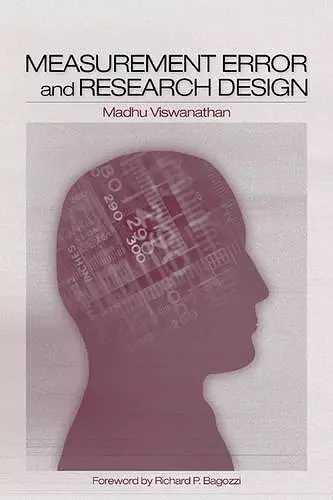Measurement Error and Research Design
Format:Paperback
Publisher:SAGE Publications Inc
Published:12th May '05
Currently unavailable, and unfortunately no date known when it will be back

Most books on measurement present a statistical orientation or an orientation toward measurement theory. Although these approaches are valuable, Measurement Error and Research Design is motivated by the lack of literature that enhances understanding of measurement error, its sources, and its effects on responses. This book′s purpose is to enhance the design of research, both of measures and of methods.
Author Madhu Viswanathan′s work is organized around the meaning of measurement error. It begins with a brief overview of measurement principles supplemented with many examples to provide necessary background to the reader. It analyzes the various causes of different types of measurement error, the nature of responses that would characterize each type of error, and the pattern of empirical outcomes that would be observed. This approach provides guidance in developing and editing items and measures and in designing methods before the fact. It is also perfect for using empirical results to redesign items, measures, and methods. Measurement is treated at a nuts-and-bolts level with concrete examples or errors and empirical procedures.
Measurement Error and Research Design is an ideal text for research methods courses across the social sciences, especially those in which a primer on measurement is needed. For the novice researcher, this book facilitates understanding of the basic principles of measurement required to design measures and methods for empirical research. For the experienced researcher, this book provides an in-depth analysis and discussion of the essence of measurement error and the procedures to minimize it. Most importantly, the book′s unique approach bridges measurement and methodology through clear illustrations of the intangibles of scientific research.
An author maintained website, features datasets and suggestions for using the book in courses.
"Dr. Viswanathan has made an important contribution to the array of books available on measurement. In his book, he calls the reader′s attention to types of errors encountered in measurement, how they are made, and most importantly, how researchers can go about identifying and eliminating them. If you are doing research, whether you are developing measures or using already developed measures, the information in this book will help you to understand how to investigate the limitations of the measures you work with."
—Dennis L. Jackson, University of Windsor, Ontario, Canada
"This book provides a useful systematic introduction to...
"Dr. Viswanathan has made an important contribution to the array of books available on measurement. In his book, he calls the reader’s attention to types of errors encountered in measurement, how they are made, and most importantly, how researchers can go about identifying and eliminating them. If you are doing research, whether you are developing measures or using already developed measures, the information in this book will help you to understand how to investigate the limitations of the measures you work with." -- Dennis L. Jackson
"This book provides a useful systematic introduction to an important and neglected area, that of measurement error in the social sciences. It will prove valuable both to students studying this topic in courses, and to Ph.D. students and researchers starting to carry out social research under their own steam." -- Dougal Hutchison
"A particular virtue of the book is the author′s balanced perspective. He acknowledges the reductionism that too often accompanies our increasingly sophisticated research methods—the risk that as we learn more and more about narrower issues we will lose sight of the larger contexts in which they are embedded. Essential, too, in the author′s view, is a receptive stance on the part of the researcher, who should maintain an openness to alternative theories, to different measures and methods, and to different interpretations of data." -- Stefan Krug, Simmons College School of Social Work
"The principles and methods outlined in this text are likely to be useful and necessary to researchers who are developing new studies." -- Holly E. R. Morrell
ISBN: 9781412906425
Dimensions: unknown
Weight: 590g
456 pages